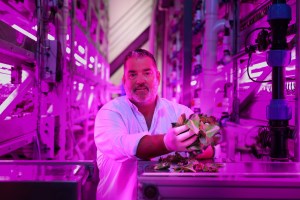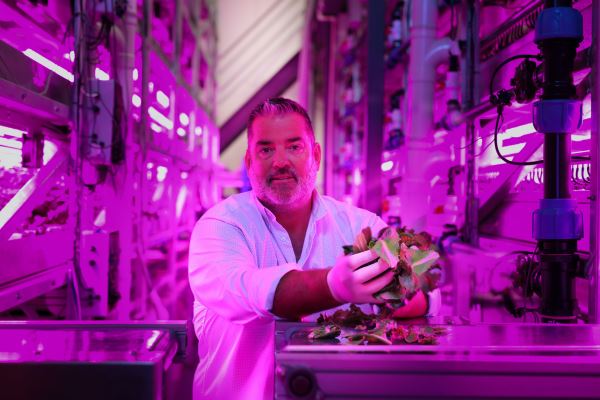With abattoirs and factories proving to be hotbeds for infection, and further concerns about virus clusters breaking out in the food supply chain, farmers and consumers are looking for safer alternatives.
Now a Queensland tech company has developed an automated indoor farming system that can help prevent the spread of infection.
Stacked Farm is Australia’s first end-to-end robotic, indoor vertical farm.
From seeding through to packaging and with leading-edge technology, physical human interaction is eliminated at every step of the farming process.
Stacked Farm CEO Conrad Smith says the new technology offers a range of benefits over traditional farming methods.
“One of the big draw cards is that from seed to packaging it’s fully automated and not once touched by the hand,” he says.
“It’s a completely clean, safe supply of fresh produce, which is grown indoors in a fully automated warehouse.”
Spike in interest
Mr Smith says his company has seen a recent spike in interest amid the coronavirus global pandemic.
“The spike in interest has been mainly centred around control over food security, food quality and food safety.”
As a result, Stacked Farm has ramped up testing and delivery of leafy greens and herbs to its national wholesaler and partner Morco Fresh.
“The greens are packaged and sealed as soon as they’re harvested by robotic farming, so it’s safe, clean and in pristine condition when delivered,” says Mr Smith.
“It doesn’t pass through the usual supply chains either – greens and herbs can go directly to wholesalers, retails, hotels and restaurants, unlike traditional produce which passes through a number of hands before reaching our shelves.
“Compared with traditional farming we can turn around a crop in a short amount of time.”
Risk-free environment
Also, the crop is not weather dependent, affected by pests and it’s grown in a risk-free environment.
Mr Smith says vertical indoor farming can also be used to produce a reliable, economical and nutritious, feed source for livestock.
“Stacked Farms can have locations close to Distribution Centre’s or Feedlots to ensure produce arrives as fresh as possible with minimal food miles travelled,” he says.
“We can grow livestock feed on mass very quickly and use up to 95 percent less water. A 1000sqm vertical farm will have enough output to feed hundreds of cattle daily.”
Since inception in March 2017, Stacked Farm has undergone a two-year period of intensive research and development at its 200sqm facility in South East Queensland.
The executive team come from a diverse background including mechanical and software engineering, robotics, traditional farming and food and beverage production.
For more information visit stackedfarm.com


